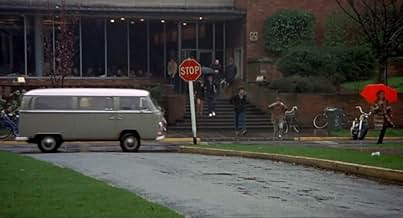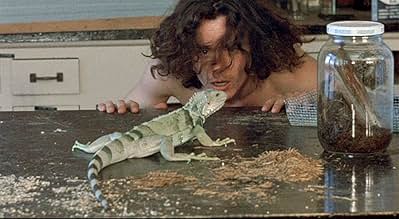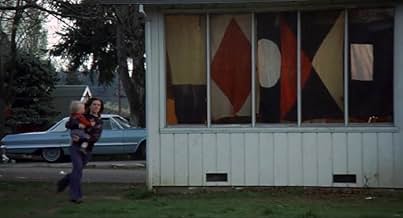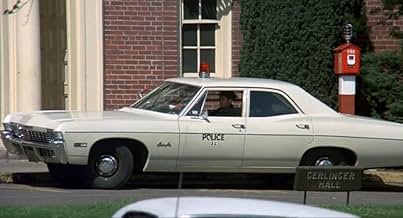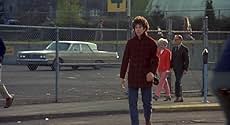IMDb RATING
5.7/10
1.9K
YOUR RATING
The star player of a college basketball team starts to go off the rails with an illicit love affair and his roommate going crazy to avoid the war draft.The star player of a college basketball team starts to go off the rails with an illicit love affair and his roommate going crazy to avoid the war draft.The star player of a college basketball team starts to go off the rails with an illicit love affair and his roommate going crazy to avoid the war draft.
- Awards
- 1 win & 1 nomination total
Michael Warren
- Easly
- (as Mike Warren)
Lynette Bernay
- Dance Instructor
- (as Lynn Bernay)
Joseph Walsh
- Announcer #1
- (as Joey Walsh)
David Ogden Stiers
- Pro Owner
- (as David Stiers)
Mireille Machu
- Secretary
- (as I.J. Jefferson)
Featured reviews
Hector (William Tepper) is a star basketball player for the College basketball team he plays for, the Leopards. His girlfriend, Olive (Karen Black), does not know whether to stay with him or leave him. And his friend, Gabriel (Michael Margotta), who may have dropped out from school and become a protester, wants desperately not to get drafted for Vietnam.
This film marks Jack Nicholson's directorial debut, a chair he would not return to often. The casting was nothing special (though Karen Black is always great); the best part may be Bruce Dern as the coach. Some day he will get the full respect he deserves.
Roger Ebert found the film "disorganized", but also said it was "occasionally brilliant" with the performances being "the best thing in the movie", including the "laconic charm" of Tepper. This seems fair. For all the good things that can be said, it never really hits home hard enough, and may be dated.
This film marks Jack Nicholson's directorial debut, a chair he would not return to often. The casting was nothing special (though Karen Black is always great); the best part may be Bruce Dern as the coach. Some day he will get the full respect he deserves.
Roger Ebert found the film "disorganized", but also said it was "occasionally brilliant" with the performances being "the best thing in the movie", including the "laconic charm" of Tepper. This seems fair. For all the good things that can be said, it never really hits home hard enough, and may be dated.
Not much to make of this directorial debut by would-be star actor and frequent attendee of Los Angeles Lakers games Jack Nicholson, "Drive, He Said," which doesn't so much get its title from the basketball played in the film as it does from a poem, "I Know a Man," by Robert Creeley, which is recited at the beginning as the college hoops game is broadcast on a TV in the background. Soon thereafter, the poem-reciting, counterculture youths dressed in camouflage paramilitary regalia invade the gymnasium of the game to put on a bit of performance art that's as vaguely against, or agitated by, rather, American militarism--specifically the Vietnam War--as is the rest of the picture. Seems the war is such a weight on these young men's minds that it drives one to insanity and another to waffle over whether he wants to really play basketball or not.
Neither character arc is very compelling, and the crazy one is over-the-top ridiculous. There are easier ways to avoid a draft, guys, whether it's for the NBA or USA. And poor Karen Black having to put up with this tomfoolery and, worse, replaying an attempted-rape climax as old as D. W. Griffith silent films and the Victorian literature he in turn stole it from. The entire film is as muddled as its basketball footage with barely a narrative to be found, and it's undoubtedly dated as an independent film from the early '70s.
On the other hand, there's enough here, to use a cliché from another sport, out of left field to be at least bemusing. Plus, at least the actors evidently know how to dribble and shoot enough to keep up with apparent real former collegiate athletes. The Leopards team's mascot is a real, caged leopard that occupies the sidelines. A lot here concerning caged animals and letting them loose, which is the sort of motif that goes for symbolism in this picture. At one point, a montage of slow-motion basketball footage is played to "The Star-Spangled Banner." As the making-of-video included on the Criterion disc claims, it also includes some guerilla filmmaking exploiting a real riot that broke out during filming at the University of Oregon, which fits seamlessly within the rest of the picture's aesthetics. The remainder of the movie mostly seems to merely revel in the Sexual Revolution, including a considerable amount of focus on male genitalia. Nicholson claims he wanted a "symphony of dicks" during a locker-room shower scene, which supposedly he had to compromise on, but not by much.
Neither character arc is very compelling, and the crazy one is over-the-top ridiculous. There are easier ways to avoid a draft, guys, whether it's for the NBA or USA. And poor Karen Black having to put up with this tomfoolery and, worse, replaying an attempted-rape climax as old as D. W. Griffith silent films and the Victorian literature he in turn stole it from. The entire film is as muddled as its basketball footage with barely a narrative to be found, and it's undoubtedly dated as an independent film from the early '70s.
On the other hand, there's enough here, to use a cliché from another sport, out of left field to be at least bemusing. Plus, at least the actors evidently know how to dribble and shoot enough to keep up with apparent real former collegiate athletes. The Leopards team's mascot is a real, caged leopard that occupies the sidelines. A lot here concerning caged animals and letting them loose, which is the sort of motif that goes for symbolism in this picture. At one point, a montage of slow-motion basketball footage is played to "The Star-Spangled Banner." As the making-of-video included on the Criterion disc claims, it also includes some guerilla filmmaking exploiting a real riot that broke out during filming at the University of Oregon, which fits seamlessly within the rest of the picture's aesthetics. The remainder of the movie mostly seems to merely revel in the Sexual Revolution, including a considerable amount of focus on male genitalia. Nicholson claims he wanted a "symphony of dicks" during a locker-room shower scene, which supposedly he had to compromise on, but not by much.
One of only three films Jack Nicholson directed. This film was kind of a dud at the time, which probably explains why Nicholson's secondary career never flowered. I have to say, he did have some talent as a director. Unfortunately, Drive, He Said isn't that good of a film. Well directed, but still a bit of a bore. William Tepper plays a college basketball star (in Ohio, as the whole film is meant to make the audience think of Kent State). His roommate, Michael Margotta, is a hippie activist who is about to be drafted. Karen Black, who made a big splash opposite Nicholson in Five Easy Pieces, plays a faculty wife with whom Tepper is having an affair. The big problem with the film is that Tepper is pretty boring and Margotta is extremely annoying. There are some good scenes, but it just doesn't come together. This one is more a candidate for rewatch than A Safe Place (which is on the same Criterion disc), though. I felt like there was something I wasn't getting. I may not have entirely liked it, but it was intriguing.
I attended college in the late Sixties, and I wanted to chime in with Titov and others who says that this is one of only a handful of movies that captures the time as lived experience rather than journalistic cliché. I can think of only three or four others: "Baby, It's You"; "Dog Fight"; and to some extent Milos Forman's first American film, "Taking Off." Not one of these films is available on Netflix. I saw each when it came out. "Taking Off" was revived pretty often for three or four years, so there must have been others who liked it as much as I did. The others I haven't seen since they were first in theaters, so I can'be sure of my present reaction. But for 40 years I've remembered the last line of "Drive, He Said," which says something.
Poorly developed and fragmented movie about a confused college basketball player with a host of predictably militant and/or cynically unhappy acquaintances characteristic of 1960s academia where the film is set. I'm not sure whether we are supposed to like or even care about the characters or not, but in any event I didn't feel much of either for any of them. Jack Nicholson directed this movie with a taste for profanity and nudity. I guess he thought he was being provocative and progressively mirroring the changing cultural mores of the time. He would have fared better by putting his energy into developing characterization and refining the script that he co-wrote instead. All in all a disappointing movie which left me with a feeling of indifference about it.
Did you know
- TriviaJack Nicholson's solo directorial debut. It was one of two post-Easy Rider (1969) Nicholson films that weren't released on any kind of home video until 2010. That year, the Criterion Collection released this movie and A Safe Place (1971) on DVD and Blu-ray as part of their "America Lost And Found - The BBS Story" box set.
- GoofsDuring the second basketball game, the writing on the Ohio Leopards jerseys frequently changes from "Leopards" to "Ohio" on a shot by shot basis.
- Crazy creditsThe opening credits are typed so small, one can hardly read them. Sometimes the letters in the names are blurred because of their ultra-small size.
- ConnectionsFeatured in Skin: A History of Nudity in the Movies (2020)
- How long is Drive, He Said?Powered by Alexa
Details
Box office
- Budget
- $800,000 (estimated)
Contribute to this page
Suggest an edit or add missing content


